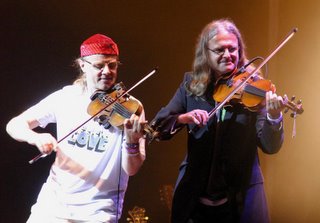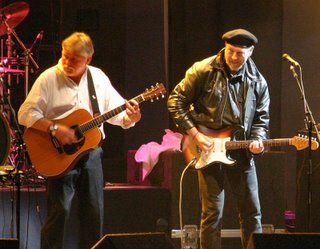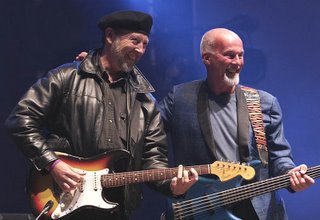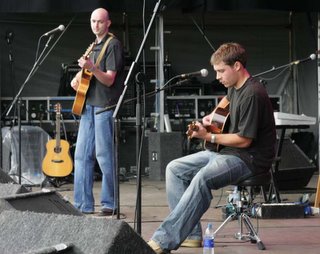 The above statement from the late, great Louis Armstrong, is by way of an introduction to another passion of mine, - Folk Music and in particular the English Folk scene. It has been a long, hard and at times, lonely journey. As my friends were tarting themselves up to go to rock and pop concerts, I was forcing myself to go down to my local pub, drink beer and listen to some of the country's best musicians and singers.
The above statement from the late, great Louis Armstrong, is by way of an introduction to another passion of mine, - Folk Music and in particular the English Folk scene. It has been a long, hard and at times, lonely journey. As my friends were tarting themselves up to go to rock and pop concerts, I was forcing myself to go down to my local pub, drink beer and listen to some of the country's best musicians and singers.But why did I get turned onto this form of music? The reasons are probably quite varied, but at the time, I was teaching myself the guitar, and most folk songs I came across could be played using the only 3 or 4 chords I knew. Obviously, the excuse to go into pubs also played a hand, but there was also something about the songs. They were songs about ordinary people doing ordinary things (and probably, originally written by another ordinary bloke watching then do it!). They provided me with an insight into the world of the 17th to early 20th centuries. Some of the songs were about rural pastimes, others about class struggle, some humourous, and others heart-breakingly sad. For some reason I still don't understand, that music touches me still.
The history of English Folk music has been a checkered one, and there have been times when we could have lost this rich heritage for good. As musical influences started to drift across the Atlantic from America, interest in our home grown music was deminished. Fortunately, one person was determined to save what he could, - Cecil Sharp who saw it as his life's mission to collect and record what he could of the music, - often going around the old country lanes on his bike and getting people to sing the songs they could remember - there are even some wax cylinder recordings of these in Cecil Sharpe House.
 Like most other folk forms, English traditional music was, in its heyday, an oral tradition, passed down through generations and reflecting everyday concerns (war, murder, deflowering maidens etc), and also handy for dancing to. Unlike its Celtic counterparts, English music has had to be brought back from the dead a few times, first by collector Cecil Sharp (and heavy friends like Ralph Vaughan Williams) in the early 20th century. Sharp had been inspired by a chance encounter with some Morris Men in 1899, and instead of running away had been moved to collect thousands of songs and dances, even traveling to the Appalachian mountains to notate tunes from descendants of English settlers. As a living tradition however, Folk music was not healthy.
Like most other folk forms, English traditional music was, in its heyday, an oral tradition, passed down through generations and reflecting everyday concerns (war, murder, deflowering maidens etc), and also handy for dancing to. Unlike its Celtic counterparts, English music has had to be brought back from the dead a few times, first by collector Cecil Sharp (and heavy friends like Ralph Vaughan Williams) in the early 20th century. Sharp had been inspired by a chance encounter with some Morris Men in 1899, and instead of running away had been moved to collect thousands of songs and dances, even traveling to the Appalachian mountains to notate tunes from descendants of English settlers. As a living tradition however, Folk music was not healthy.Revival(s)
By the early 1960s though, the second Folk Revival (the first had been around the time Sharp had his Road to Oxford conversion) was underway. Collector Bert Lloyd was doing similar work to Sharp and fired by similar movements in the US, songwriter Ewan MacColl spearheaded a modern, politicised acoustic music (along with singers like Tom Paxton) that drew upon English folk's rich past. This was the golden age of the English folk club and the inspiration for the next wave; Folk Rock.
 With the folk boom still in full effect, younger musicians started to fuse Folk harmony and lyrical concerns (more murder, deflowering maidens, etc) with rock rhythms and (gasp) electric instruments. While no doubt anathema to some, bands like Fairport Convention (previously West Coast rock copyists), Steeleye Span and Ashley Hutchings' Albion Band looked for audiences that wouldn't be seen dead singing sea shanties in Somerset pubs. They also provided me with an opportunity to musically meet my rock loving friends somewhere on common ground. What's more, these bands really did it, hitting the album charts regularly during the 70s and even influencing the likes of Led Zeppelin. Others like Pentangle took a jazzier approach, while the Incredible String Band and Amazing Blondel went all cross cultural and psychedelic with their rambling, fragile concotions of sitars, harps and hallucinogenic substances.
With the folk boom still in full effect, younger musicians started to fuse Folk harmony and lyrical concerns (more murder, deflowering maidens, etc) with rock rhythms and (gasp) electric instruments. While no doubt anathema to some, bands like Fairport Convention (previously West Coast rock copyists), Steeleye Span and Ashley Hutchings' Albion Band looked for audiences that wouldn't be seen dead singing sea shanties in Somerset pubs. They also provided me with an opportunity to musically meet my rock loving friends somewhere on common ground. What's more, these bands really did it, hitting the album charts regularly during the 70s and even influencing the likes of Led Zeppelin. Others like Pentangle took a jazzier approach, while the Incredible String Band and Amazing Blondel went all cross cultural and psychedelic with their rambling, fragile concotions of sitars, harps and hallucinogenic substances. While the folk rockers, er, rocked, singer songwriters like John Martyn (OK he's a Scot), Nick Drake, Sandy Denny and Ralph McTell forged a distinctively English take on the acoustic guitar/sensitivity combination. More recently musicians like Kate Rusby, Eliza Carthy, Northumbrian Piper Kathryn Tickell(along with slightly elder statesmen like Martin Carthy, Martin Simpson and Norma Waterson) have moved back to a more traditionally flavoured approach, though there's little about them that's retro. Billy Bragg, The Oyster Band and others have also extended the folk rock heritage.
While the folk rockers, er, rocked, singer songwriters like John Martyn (OK he's a Scot), Nick Drake, Sandy Denny and Ralph McTell forged a distinctively English take on the acoustic guitar/sensitivity combination. More recently musicians like Kate Rusby, Eliza Carthy, Northumbrian Piper Kathryn Tickell(along with slightly elder statesmen like Martin Carthy, Martin Simpson and Norma Waterson) have moved back to a more traditionally flavoured approach, though there's little about them that's retro. Billy Bragg, The Oyster Band and others have also extended the folk rock heritage.My excuse for all of the above, is that I recently read that there is yet another revival going on. People are turning on to the purer, acoustic sounds of folk and roots music, and connecting, once again with a tradition and culture that was yet again about to die. This is something I truely welcome, as it will bring more young people and diversity into the genre, and we can move away from the commercially driven pap we get thrust at us. There is a web-radio I always switch to on a Sunday morning, and is really worth a listen, Folk Alley, an American station that plays some of the best folk music from around the world, you will ever hear. You may even like it, I know I do.
5 comments:
I was born into BlueGrass & Rock-a-billy Gospel music, so the things of which you write sound very familiar.
Great research!
Hi Mark,
I love English folk music! You like the Oysterband, do you like the Levellers as well? I've recently seen Richard Thompson and Eliza Carthy & friends/relations, check out my blog. I also like real ale, funnyhow these things seem to go together!!
Val
I have listened to Folk Alley for a few years now. I have to admit, it's usually when I can't get my US roots music online stations, KPIG, Bootliquor Radio, and WDVX.com
That was an excellent, informative post. Glad I stopped by!
Hi Val and Jon.
You're very welcome, and I appreciated your comments. For me, having lived through the '60s and '70's revivals, it good to see the genre flourishing and thriving.
Look forward to hearing from you again
I completely agree with the above comment, the internet is with a doubt growing into the most important medium of communication across the globe and its due to sites like this that ideas are spreading so quickly.
free online streaming
Post a Comment